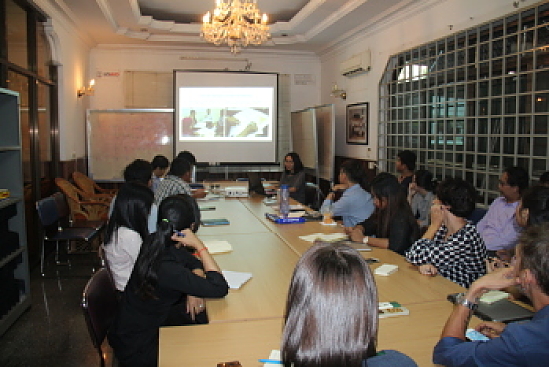On August 23rd (2 pm – 5 pm) The ICT4D Cambodia Network implemented by ODC supported by the SPIDER organized (ICT4D) an informal meeting on ICT4D in education at ODC office. This is an informal meeting to gather CSOs, both tech and non-tech who are working/interested in Education sectors and ICT sectors, so that they can share the progress, achievement/success stories, experience, challenges, and opportunities in their work in applying ICT in Education in Cambodia. There were 19 participants (8 female) from ODC, Kampuchean Action for Primary Education (KAPE), InSTEED iLab Southeast Asia, Development Innovations, Step IT academy, Edemy, AusCam Freedom Project, Cambodian-Japan Cooperation Center (CJCC), ITC lecturer (Nimol), VSO, Cambodian Childrens Fund (CCF), and NGO Education Partner (NEP).
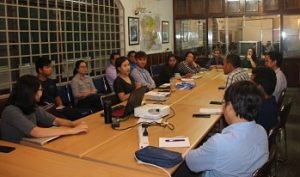
Reporting projects to date
Starting from an introduction session from each other participant’s projects and organizations attended into the meeting, they were encouraged to share their practical experiences and lessons learn of each projects either ICT or non-ICT NGO projects and private companies. Thus, it was suggested “Just to treat this meeting as such an informal party or meetings”, where everyone are most welcomed to share, speak, and discuss things related education, and in particularly ICT4D in education. Right at this moment, we have not had any idea of “how many ongoing ICT-educational projects, how many and what existing mobile apps and website platforms, and even other management systems have been developed for the purpose of improving the quality of educational related projects in Cambodia”. It’s somehow solutions were already out there whether traditional or modern communication technologies that interested people or projects should be kept informed and updated through many kinds of communication platforms or face-to-face meetings.
Very brief who doing what and what ICT-related educational projects in Cambodia;
KAPE is one of the leading and largest NGO in Cambodia to work promoting equality and equity education in Cambodia. Working closely with the Ministry of Education, Youth and Sports (MoEYS), KAPE deployed and developed ICT solutions which engage and stimulate young minds and enable improved learning outcomes. For next year, KAPE is one of the local organization that will be funded by the ministry to expand “New General Schools program”, which was equipped and taught through using ICTs.
AusCam Freedom Project, is an Australian registered charity created as a direct response to the human rights abuses affecting young women and children in Cambodia. It is currently working in education sector but it does not have any project related ICT.
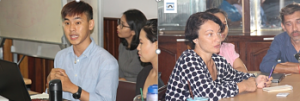
Step IT Academy is the international educational institution that specialize in IT education and the largest Microsoft, Cisco, Autodesk authorized learning center founded in 1999 operating for 18 countries, 46 branches in the globe.
VSO had used to implement ICT projects in the past in Cambodia called “Basic English Language (BEL)”. It taught teachers and their students learning English through developed teaching and learning materials included books and digital apps for smartphones contain innovative audio-visual material that can be easily accessed and updated even in remote areas and as well as training videos published on YouTube channel.
NEP is a membership organization that promotes active collaboration between NGOs working in education and advocates on behalf of its member organizations in policy meetings and discussions with the Ministry of Education Youth and Sports (MoEYS) in Cambodia.
CCF’s Education program is designed to serve as for lifelong learning, as well as operating education facilities and satellite schools, that deliver education and support into the hardest to reach communities. In 2017, CCF, with the support from Microsoft, has taught digital literacy for elderly Cambodian students.
Presentation and discussion
There were two presentations about the process of developing TWO educational ICT applications which followed by questions and feedback from the other participants; (1) E-Career Counseling from Cambodian Youth (Trey Visay), and (2) Case Study: Deconstructing Design: Transforming reading assessment through technology in Cambodia (TEST App) http://www.development-innovations.org/wp-content/uploads/2018/07/WEIs-TEST-App-Case-Study.pdf).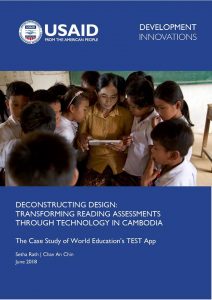
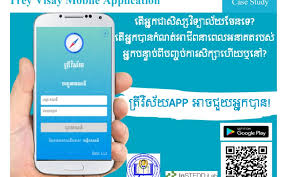
There was a main concern questioned on sustainability of these apps in the future. It shall be sharing its presentation and also expanding to some NGO-educational projects where there is tablet at their target to use existing applications to gain positive results through our lead NGO-education projects, for instance NEP. Most of the digital applications (mobile and website applications) will be rolled out in nationwide and handed over to the ministry once funding ended. However there was an idea suggested to run ads or any for-profit initiative to generating income for keeping support and maintaining apps in the future rather than implement without profit based. Last but not least, a question; was there any research conducted prior to product development whether there is any existed apps or any apps that most similar idea in other to save resources.
Recommendation and suggestion
Finally, most participants were enthusiastic and showing their commitment in having next meetings frequently and regularly (a meeting every 3 months). They hope to run in a more formal meeting and involves the people from government sector, especially Department of Information Technology (DIT).
Next events
-The ICT4D National Workshop is planned in October to bring all relevant stakeholder of ICT and non-ICT projects to come together with the government to discussed and shared particular topic related to ICT4D in Cambodia (TBC). We will get back to you later more information after we make any decision within our core member.
-ODC is also planning to organize Cambodia ICT Camp and currently we are in the early phase of designing the camp with the goal to maximize its effectiveness and impact. ODC is seeking for opinions and recommendations, as well as supports from experts and communities that would very helpful to ODC consolidating all inputs for a very well-arranged and organized.

